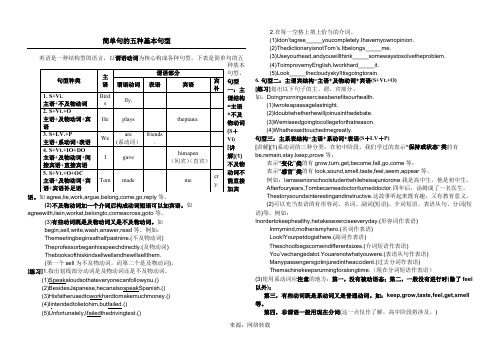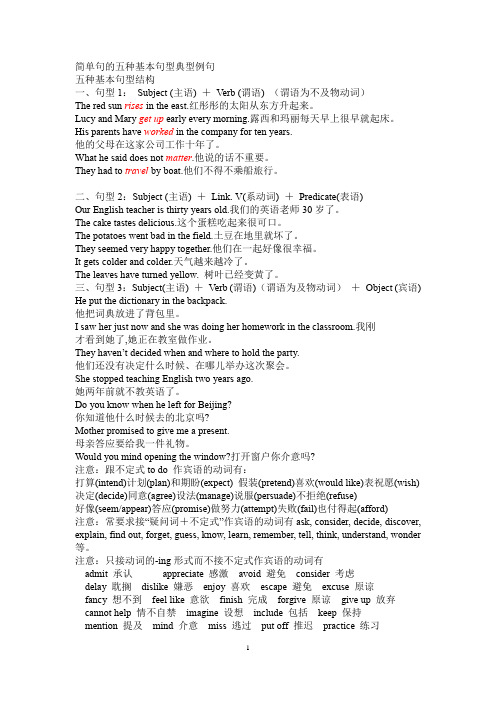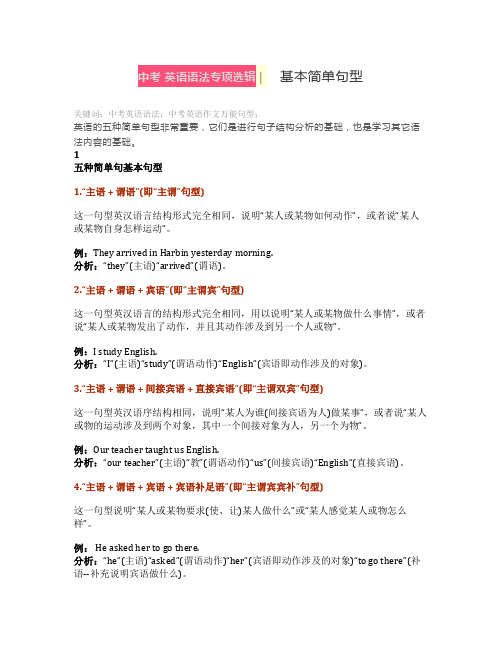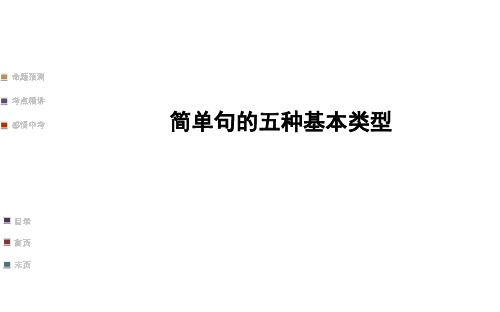五种简单句型
英语简单句五大句型

子有一个共 同特点,即 句子的谓语
She sings beautifully.
动词都能表
2) S + Vi+ prep Phrase(介词短语) 达完整的意
思。
He we43; Vi+ Infinitive (不定式)
做不及物动
We stopped to have a rest.
I feel something moving.
常用于这句型的动词有:catch, feel, find, get, have, hear, keep, leave, notice, see, smell, watch等。
1 I don't know study English. 2 We are don't spent much time playing computer
注意:She brought her boyfriend to the party.
Bring a present for Mary.
You can leave the cooking to me.
Someone left the note for you.
5. S (主)+ vt(谓)+ O(宾) + O C(宾补) 1) S + vt + n./pron + n. We named our baby Tom.
4) S + Vi+ Participle (分词)
词,后面可 以跟副词、 介词短语、
I'll go swimming.
不定式、分
词等。
2. S (主)+ vt (及物动词)(谓)+ O(宾)
简单句5种基本句型

简单句的五种基本句型英语是一种结构型的语言,以谓语动词为核心构成各种句型。
下表是简单句的五[(1)Speakaloudsothateveryonecanfollowyou.() (2)BesidesJapanese,hecanalsospeakSpanish.() (3)Hisfatherusedtoworkhardtomakemuchmoney.() (4)Iintendedtolietohim,butfailed.()(5)Unfortunately,Ifailedthedrivingtest.()2.在每一空格上填上恰当的介词。
(1)Idon’tagree_____youcompletely.Ihavemyownopinion. (2)ThedictionaryisnotTom’s.Itbelongs _____me.(3)Useyourhead,andyouwillthink_____somewaystosolvetheproblem. +宾语(S+Vt.+O)(S +LV +P)“保持或状态”类的有等;等。
我是高中生,他是初中生。
四年后,汤姆成了一名医生。
这故事听起来既有趣,又有教育意义。
(短语)、介词短语、表语从句、分词(短形容词作表语)) )介词短语作表语)表语从句作表语) 过去分词作表语)(现在分词短语作表语)(3)使用系动词应注意的地方:第一,没有被动语态;第二,一般没有进行时(除了feel 以外);第三,有些动词既是系动词又是普通动词。
如:keep,grow,taste,feel,get,smell 等。
第四,非谓语一般用现在分词(这一点仅作了解,高中阶段将涉及。
)例如:Aftertwo-day’streatment,hefeltwellagain.(不用wasfelt) Heremainsanexcellentengineerinthefactory.(不用isremained)比较:We grew sometreesaroundourschoolandthey grow greennow.(grew 是及物动词,意思是________;而grow 是系动词,意思是________) Thepetdog keeps clean.Itis kept byJohnson.(keeps 是________动词,意思是________;而kept 是________动词,意思是________)JustnowI felt thetableandit felt smooth.(摸”;而第二个是________动词,意思是[练习]e)engineer.(2)Putthemeatintherefrigerator(冰箱ce.(7)Pleasekeep__________(安静句型四:主谓双宾结构=主语+及物动词+DO)[讲解](1物为直接宾语。
简单句的五种基本句型典型例句

简单句的五种基本句型典型例句五种基本句型结构一、句型1:Subject (主语) +Verb (谓语) (谓语为不及物动词)The red sun rises in the east.红彤彤的太阳从东方升起来。
Lucy and Mary get up early every morning.露西和玛丽每天早上很早就起床。
His parents have worked in the company for ten years.他的父母在这家公司工作十年了。
What he said does not matter.他说的话不重要。
They had to travel by boat.他们不得不乘船旅行。
二、句型2:Subject (主语) +Link. V(系动词) +Predicate(表语)Our English teacher is thirty years old.我们的英语老师30岁了。
The cake tastes delicious.这个蛋糕吃起来很可口。
The potatoes went bad in the field.土豆在地里就坏了。
They seemed very happy together.他们在一起好像很幸福。
It gets colder and colder.天气越来越冷了。
The leaves have turned yellow. 树叶已经变黄了。
三、句型3:Subject(主语) +Verb (谓语)(谓语为及物动词)+Object (宾语) He put the dictionary in the backpack.他把词典放进了背包里。
I saw her just now and she was doing her homework in the classroom.我刚才看到她了,她正在教室做作业。
They haven’t decided when and where to hold the party.他们还没有决定什么时候、在哪儿举办这次聚会。
初中英语语法专项之五个基本简单句型句子成分

中考英语语法专项选辑 | 基本简单句型关键词:中考英语语法;中考英语作文万能句型;英语的五种简单句型非常重要,它们是进行句子结构分析的基础,也是学习其它语法内容的基础。
1五种简单句基本句型1.“主语 + 谓语”(即“主谓”句型)这一句型英汉语言结构形式完全相同,说明“某人或某物如何动作”,或者说“某人或某物自身怎样运动”。
例:They arrived in Harbin yesterday morning.分析:“they”(主语)“arrived”(谓语)。
2.“主语 + 谓语 + 宾语”(即“主谓宾”句型)这一句型英汉语言的结构形式完全相同,用以说明“某人或某物做什么事情”,或者说“某人或某物发出了动作,并且其动作涉及到另一个人或物”。
例:I study English.分析:“I”(主语)“study”(谓语动作)“English”(宾语即动作涉及的对象)。
3.“主语 + 谓语 + 间接宾语 + 直接宾语”(即“主谓双宾”句型)这一句型英汉语序结构相同,说明“某人为谁(间接宾语为人)做某事”,或者说“某人或物的运动涉及到两个对象,其中一个间接对象为人,另一个为物”。
例:Our teacher taught us English.分析:“our teacher”(主语)“教”(谓语动作)“us”(间接宾语)“English”(直接宾语)。
4.“主语 + 谓语 + 宾语 + 宾语补足语”(即“主谓宾宾补”句型)这一句型说明“某人或某物要求(使、让)某人做什么”或“某人感觉某人或物怎么样”。
例: He asked her to go there.分析:“he”(主语)“asked”(谓语动作)“her”(宾语即动作涉及的对象)“to go there”(补语--补充说明宾语做什么)。
5.“主语 + 系动词+ 表语”(即“主系表”句型)这一句型用以说明“某人(某物、某事、某种概念)具有什么特征或处于什么状态”。
简单句的五种基本类型整理

简单句的五种基本类型整理简单句的五种基本类型简单句:只包含一个主语(或并列主语)和一个谓语(或并列谓语)的句子,称作简单句。
简单句的基本句型:简单句有以下5种基本句型。
1.主语+ 不及物动词例:It is raining heavily.My tooth aches.2.主语+ 及物动词+ 宾语例:They enjoy the play.I met John in the street yesterday.3.主语+ 系动词+ 表语例:He is out.Jenny is fine.It looks like rain, soon.4 主语+ 及物动词+ 双宾语例:He bought her a watch.The sun gives us light.注意:双宾语一个指人(即间接宾语),另一个指物(即直接宾语)。
一般间接宾语位于直接宾语的前面,有时它们也可交换位置,这是需要在间接宾语的前面加上介词to 或for 。
常见的双宾语结构:bring sb. sth (bring sth to sb). give sb. sth (give sth to sb.) hand sb. sth (hand sth to sb.) leave sb. sth (leave sth.to sb) lend sb. sth (lend sth to sb) pass sb sth (pass sth to sb)return sb. sth (return sth to sb) send sb sth (send sth to sb) show sb sth (show sth. to sb.) tell sb sth (tell sth to sb )write sb sth (write sth to sb ) buy sb sth (buy sth for sb )do sb sth (do sth for sb ) get sb sth (get sth for sb )make sb. sth (make sth for sb) pay sb. sth (pay sth for sb)sing sb sth (sing sth for sb )5.主语+ 及物动词+ 宾语+ 补足语例:She found him a very clever student.I make it a rule to get up early in the morning.注意:当宾语意思表达不完整时,需要用不足与补充说明宾语的状态、性质等。
高中英语简单句的五种基本类型优选份

高中英语简单句的五种基本类型优选份高中英语简单句的五种基本类型 11.主语+不及物动词不及物动词的后面不接宾语,但很多时候,这个不及物动词有副词或别的状语修饰。
有的动词如果不加状语修饰,句子的意思就可能不完整。
如:Mr. Li stayed. → Mr. Li stayed until the meeting was over.She lived. → She lived in the country.2.主语+系动词+表语在这类结构中,可用作表语的有分词、形容词、名词、代词、副词、介词短语等。
如:We are determined to pete for the first prize in the match.She was too tired.Mr. Li is a middle school teacher.It’s me.The light was out.Your father is in his office.3.主语+及物动词+宾语可以用作宾语的通常有名词、代词等。
如:I saw a film yesterday.I didn’t meet him at the meeting.4.主语+及物动词+间接宾语+直接宾语这类结构中的间接宾语和直接宾语又统称为双宾语。
常接双宾语的动词有:give, pass, send, teach, buy, bring, show等。
直接宾语和间接宾语的位置通常可以互相交换。
当直接宾语:Mother bought me a watch. →Mother bought a watch for me.She showed us her new dress. →She showed her new dress to us.5.主语+及物动词+宾语+宾补可以用作宾补的词语有形容词、分词、副词等。
如:I heard him singing in her room.We must keep our rivers clean.任何句子都是在上述的这些句子的基础上变化而来的。
简单句的五种类型

注意: 如果动词词组是“动词+副词”型, 而宾语又是代词时, 只能 将宾语置于动词和副词之间; 若宾语是名词, 则在副词前后均可。
2. 主语+及物动词+宾语(S+Vt+O)
注意: 如果动词词组是“动词+副词”型, 而宾语又是代词时, 只能
将宾语置于动词和副词之间; 若宾语是名词, 则在副词前后均可。
【解析】选C。考查系动词辨析。stay“停留; 保持”; feel“感
觉”; taste“品尝”; sound“听起来”。句意: 我真的喜欢(吃)
这些面条和蔬菜。它们吃起来味道非常好。所以选C。
4. 主语+及物动词+宾语+宾语补足语(S+Vt+O+C)
这种句型可简称为主谓宾补结构, 其补语是宾语补足语, 与宾
语一起构成复合宾语。例如:
.
我们必须保持教室整洁。
4)主语+谓语+宾语+宾语补足语 I saw him seated there.
注意动词不定式作宾补的情况:
a)带to的动词不定式: ask, tell, invite, get, beg, wish, want, like, prefer, hate, encourage,advice , warn 等 b) 使役性动词have, make, let后要用不带to的不定式
a)间接宾语后置时,其前用介词to: give, send, bring, pass, lend, hand, tell, return, write, throw, teach等 B)间接宾语后置时,用介词for:
make, buy, do, get, paint, play, save, order , serve等
英语简单句的5种句式

动词(按简单句五种基本句型归类 )第一种: 主语+ 连系动词+ 表语( S+V+P )第二种: 主语+ 不及物动词( S+V )第三种: 主语+ 及物动词+ 宾语( S+Vt+O )第四种: 主语+ 及物动词+ 间接宾语+ 直接宾语( S+V+ IO + DO )(主语+ 及物动词+ 间接宾语+ 直接宾语S+V+ DO +prep.+ IO )第五种: 主语+ 及物动词+ 宾语+ 宾语补足语(S+V+O+C)一、只符合一种句型的有149个:第一种: 主语+ 连系动词+ 表语( S+V+P )1.become 变得,变为The weather became warmer.2.feel 感觉;摸;触;摸起来……的感觉I‟m not feeling well.3. sound 听起来;似乎The music sounds very beautiful.4.taste品尝,尝味道This coffee tastes a little sour(酸).第二种: 主语+ 不及物动词( S+V )5.arrive 到达; 达到They‟ll arrive tonight.arrive at / in a place. 到达某地. They‟ll fly from New York on June 30 and arrive in Beijing on July 1. 6.begin 开始;着手The first class begins at 8:00 a.m..7.born ;(动词bear的过去分词)出生be born 出生于He was born in Gansu in 1985. I was born in Beijing on May 2, 1984.8.come 来;来到come back 回来come down 下来come from 出生(于); 来(自) come in 进入;进来come on 赶快;来吧come out 出来When does the next bus come? Where do you come from?9.cost 值(多少钱);花费How much does the shirt cost?10.dance跳舞Will you dance with me?11. die 死Chairman Mao Zedong died in September.12.fail 失败;不及格I almost failed in the exam. I only got a “3”13.fall (fell, fallen) 落下;下降;倒下;跌倒They all fell into the snow with Sally on top of them.I fell off my bike just now .fall asleep 入睡I fell asleep halfway through the film.14.fish捕鱼;钓鱼Look, he‟s fishing.My favorite sport is fishing with my father.15.fly (flew, flown )飞;飞行;乘飞机旅行We fly to Shanghai on Friday and Sunday.16.go ( went, gone)1.去;走;驶;.通到;到达go back 回去go on 继续go shopping 买东西go for a walk 散步go to the cinema 看电影go home 回家I usually go to bed at about 10 o‟clock.Well then, you must go home as fast as you can. 17.happen 发生What happened?/ What has happened?18. hurry 赶紧;急忙Every workday morning my parents hurry to work.hurry up 赶快;快点Hurry up, or you will be late for school.19. jump 跳;跳跃I jump out of bed and go into the bathroom to take my shower.20. laugh 1).笑;大笑2).嘲笑The girls are watching and laughing.laugh at 嘲笑Don‟t laugh at others , please laugh with them.They look so funny that everyone laughs.21. leave ( left, left ) 1.离开2.把…留下;剩下She doesn‟t leave until 9o‟clock in the evening.22. lie (lay, lain) 躺;卧; 平放He lay awake for a long time thinking last night.23. listen 仔细听;倾听Listen! What is he talking?listen to 听……(讲话)They often listen to music.24. live 居住; 活着;生存;生活My mother has lived in Beijing for 50 years.25. move 移动;般动;搬家Mrs. Wilson moved into Main street last month.26. rest 休息;歇息You‟d better rest for a while .27.shine (shone, shone)1.照耀;发光;2.使发光;使发亮The sun was shining and the birds were singing yesterday.. 28.shop 到商店买东西Would you like to go shopping with me this afternoon?29.sit ( sat, sat) 坐She was sitting on the sofa when I came into the room.30.sleep(slept, slept)睡觉: He didn‟t sleep well last night.31.smile微笑: The boy‟s manners made everybody smile.32.stand (stood, stood )站;站起Everyone stood up when the singer came in.33.step 走,跨步Somebody stepped on my foot just now.34.appear 出现This singer appears on television frequently.35.deal 处理I must deal with the difficulties.36. develop 发展China has developed into a strong country.37. disappear 消失When spring comes, the snow disappears.38.dive 跳水The young man dived into the sea for pearls(珍珠).39. escape 逃脱;逃走He escaped from the prison.40.freeze(froze, frozen )使结冰,凝固Many fruits can be frozen very easily.47. rush 冲The children rushed out of the classroom.48. reply 回答She replied to my letter quickly.49. skate 滑冰Will you go skating with me this weekend?50.ski 滑雪We hope we can go skiing in the Switzerland.51. smoke吸烟;冒烟;冒气My father doesn‟t smoke.The fire is smoking.52. surf 冲浪Can you surf? surf the internet第三种: 主语+ 及物动词+ 宾语( S+Vt+O )53. answer 回答;答复;回信Tom‟s mother answered the phone.54. beat (beat, beaten )敲打;(脉,心脏) 跳动; 打胜,打赢The country team beat us.55. brush 刷;擦I brush my teeth , comb my hair and go to the kitchen for breakfast .56. carry 运送;搬运;携带 A telephone could carry people‟s voice from one place to another.57. catch(caught, caught )接住;捉住;赶上(车);患(传染病等)catch (a) cold 着凉;伤风Peter caught a cold last night.The goalkeeper could not catch the ball58. change .改变;更换He often changes his jobs and he never stays in a place for a long time.Where can I change the dollars?59. choose (chose, chosen ) 挑选;选举The Party has finally chosen a woman as leader. He chose to learn English rather than French at the age of 8.60. clean 弄干净;擦干净They have just cleaned the house.61.close 关;闭I have closed the cage.62. decide决定;下决心I decided to take a trip to Hainan.It was finally decided that four London hospitals should be closed.I can‟t decide what to do .63. drive (drove, driven) 驾驶;驱赶I drive a taxi..64. enjoy 欣赏;享有They are all enjoying themselves very much at the party.They enjoyed the food very much.65. excuse 原谅;宽怒Excuse me, do you have any water, Miss Black?66. finish 结束;做完He didn‟t finish working until 5 o‟clock..He had finished high school by 200367. follow 跟随;(表示时间,次序等)接着The runners followed a blue line that was painted on the street for them.Monday follows Sunday.68. have (had, had) 有;吃;喝;进行;经受have a good time 玩得很高兴;过得愉快Yesterday I had a good time at the party.have a cold 感冒have a meeting/match/rest /swim/talk /walk 开会(比赛,休息,游泳,谈话,散步)have breakfast /lunch/supper 吃早饭(吃午饭,吃晚饭)have some medicine 服药You can have some medicine three times a day.have lessons/classes 上课have sports 进行体育活动have to 不得不;必须Do you have to leave right away?How many eggs do you have?69. hurt (hurt, hurt)伤害;伤痛I hurt my arm last summer.70. invent 发明;创造Who invented the lightening-bulb?71. join .连接;参加;加入The boys are playing football. Shall we go and join them?We‟re going to visit the museum. Will you join us?Sometimes parents join their children to watch cartoons.72. kill 杀死;弄死In the end she was killed by the Nazis.To our surprise, he killed his own mother .73. learn (learned, learned; learnt ,learnt )学会;知道;了解We can learn many things from the CCTV news.Do you come here to learn singing?We all learned that the earth turns around the sun.74.like 喜欢,喜爱;想要(would /should like);be like 像I‟d like to buy two tickets for Shanghai.Kate, would you like to sing a song with us?75.mean (meant, meant)意思是;意味着“Bei” means “north”, and “jing” means “capital”.What do you mean?76.mend 修理My father used to mend our shoes.77.miss 想念;惦记;错过;未看见I misses my mother very much. The post office is on the end of the street. You can‟t miss it. 78.mind 关心;介意Would you mind opening the window? Of course not. 79.need 需要;必需You need a good rest.80.open打开;张开The driver opened the door .81.own拥有The rich man owed a large house.82.pick拾起;采集I like to pick the fruit .He stopped the car to pick up a young girl.83.plant 种植;播种How many trees they have planted since 1990!84.post 邮寄Where are you going to post the letter?85. pull 拉;拖Mum will be here to pull you out of bed! I can pull a tree down.86.push 推You shouldn‟t push people in the crowed street.87. reach到达;抵达; 够着The elephant tried to reach the fruit with his trunk. When did you reach Beijing?88. remember 记得;想起You will remember to wash behind your ears.I remembered that I saw him the day before.My old grandmother remembered closing the door .89. read(read, read)读;朗读We often read books in the library.90. ride(rode, ridden )骑马;骑自行车;乘车旅行She learnt to ride at the age of seven.I‟ve never ridden a horse before.91. ring (rang, rung)(钟、铃等)响;给(某人)打电话ring up打电话给Please ring me up if you need any help.92. swim 游;游泳Let‟s go swimming in the sea.93. save 救;挽救;节约The dog saved the boy‟s life.We should save some money for future use. 94.sell ( sold ,sold) 售,卖: He sold his old camera and bought a new one.95.spend (spent, spent) 花费(时间、金钱);度过My sister spent 1,000 Yuan on the new TV.How do you spend your weekend?96.stop(stopped, stopped)使停止;阻止;停止;停下来(做某事)It will stop raining soon.She stopped her car in front of the store.I have to stop to have a rest because I was too tired.97 . surprise 使惊奇;使诧异His answer surprised us very much.98.travel (长途)旅行Many people like traveling.99. visit 参观;拜访;访问I will visit my uncle this weekend.100. wash洗Wash your hands before each meals. 101.welcome 欢迎We welcome you to our new school.102. afford 买得起;付得起We can‟t afford to buy a car.103. attack 攻击;袭击We have attacked the enemies .104. attract吸引The beautiful park attracts many people.105.cause 导致 A fever caused his death.106.celebrate 庆祝We celebrated her Christmas last week.107. check 检查Tony checked the answers with mine just now.108. climb 爬The monkey climbed the big tree.109. collect 收集Do you collect foreign stamps?110.connect连接 A bus line connects the two villages.111. count计算The little girl counted the numbers of apples112.decorate装饰She decorated the room with some flowers..113. discover 发现Chinese people discovered the gunpowder hundreds of years ago. 114.explore探险,探索The students explored the countryside last summer. 115.feed 喂;喂(养); 饲(养)Have you fed the bird?116. guide引导He guided me through the town.117.Hang(hung, hung)悬挂;吊着She hung the picture on the wall.118.lock把……锁上, 用锁锁住(某物)He forgot to lock the back door last night.119. lose (lost ,lost ) 丢失;失败His uncle lost his left leg in the traffic accident. 120.phone 打电话I will phone you this evening.121.plan计划;打算Have you planned your trip through Europe?I plan to go to Australia in the near future.122. prefer更喜欢I prefer coffee to tea.123. print打印;印刷This newspaper did not print the news.124. produce生产;制造The factory produces 10,000 cars a month.125. realize知道;了解;认识到(某事物的重要性)He didn‟t realize the danger.126. refuse拒绝She refused my invitation. He refused to listen to me.127. repair修理Can you help me repair the computer?128. score得分Our team scored five points.129.serve服务The food is heated and then taken out of the oven and served. 130. solve解决Can you solve the problem by yourself?131. spell拼写How do you spell your name?132. steal(stole, stolen)偷;窃取The thief stole their car last night.133. sweep(swept, swept)扫;打扫She always helps his mother sweep the floor.134. treat 对待;看待Don‟t treat me as a little child.135.waste浪费You had better not waste your money on such a thing.第四种: 主语+ 及物动词+ 间接宾语+ 直接宾语( S+V+ IO + DO )(主语+ 及物动词+ 间接宾语+ 直接宾语S+V+ DO +prep.+ IO )136. borrow (向某人) 借用May I borrow you a pen ? (May I borrow a pen from you?) 137. hand 给,传递I handed him the ball。
- 1、下载文档前请自行甄别文档内容的完整性,平台不提供额外的编辑、内容补充、找答案等附加服务。
- 2、"仅部分预览"的文档,不可在线预览部分如存在完整性等问题,可反馈申请退款(可完整预览的文档不适用该条件!)。
- 3、如文档侵犯您的权益,请联系客服反馈,我们会尽快为您处理(人工客服工作时间:9:00-18:30)。
一. 五种简单句基本句型
1.“主语+ 谓语”(即“主谓”句型)
这一句型英汉语言结构形式完全相同,说明“某人或某物如何动作”,或者说“某人或某物自身怎样运动”。
例:They arrived in Harbin yesterday morning.
分析:“they”(主语)“arrived”(谓语)。
2.“主语+ 谓语+ 宾语”(即“主谓宾”句型)
这一句型英汉语言的结构形式完全相同,用以说明“某人或某物做什么事情”,或者说“某人或某物发出了动作,并且其动作涉及到另一个人或物”。
例:I study English.
分析:“I”(主语)“study”(谓语动作)“English”(宾语即动作涉及的对象)。
3.“主语+ 谓语+ 间接宾语+ 直接宾语”(即“主谓双宾”句型)
这一句型英汉语序结构相同,说明“某人为谁(间接宾语为人)做某事”,或者说“某人或物的运动涉及到两个对象,其中一个间接对象为人,另一个为物”。
例:Our teacher taught us English.
分析:“our teacher”(主语)“教”(谓语动作)“us”(间接宾语)“English”(直接宾语)。
4.“主语+ 谓语+ 宾语+ 宾语补足语”(即“主谓宾宾补”句型)
这一句型说明“某人或某物要求(使、让)某人做什么”或“某人感觉某人或物怎么样”。
例:He asked her to go there.
分析:“he”(主语)“asked”(谓语动作)“her”(宾语即动作涉及的对象)“to go there”(补语—补充说明宾语做什么)。
5.“主语+ 系动词+ 表语”(即“主系表”句型)
1927年6月,国民政府公布的《大学教员资格条例》还规具有什么特征或处于什么状态”。
汉语的“是”字结构属于这一英语句型的形式之一。
常用的联系动词有be, keep,lie, remain, stand, become, fall, get, go, grow, turn, look, feel, seem, smell, sound, taste, 等。
例:I am a teacher. 我是一名老师
1946年制定的《教育宪法》更是强调对教育的投入:“边远�表语—即表明主语的身份)。
二. 三种中考必考句型
“教育、科学、文化之经费,在中央不得少于��存在”句型)
这一句型用以说明“在某地或某时存在某人或某物”。
例:There is a bird in the tree. 在树上有一只鸟。
不仅如此,《教育宪法》还地点)“there is a bird”(存在物)。
不仅如此��
这一句型用以比较物质甲与乙之间的异同。
“??\比较: …as + 形容词/副词原级+ as…; …as + 形容词+名词+ as…
例:He is as rich as John. 他和约翰一样富有。
例:He has as much money as she does. 他和她的钱一样多。
1927年6月,国民政府公布罢容词/副词比较级+ than…
例:She is more careful than he.她比他细心多了。
这就是说,民国时期小学教师的最低工资竟是县长工资的两倍。
除抗战胜利后发生通货膨胀,使得教师薪水赶不上物价上涨外,一�
例:He is the tallest in the class.他是班上最高的。
3.“it + is/was + 形容词+ to do/that从句”(即评价句型)
这一句型用于说明“做某一动作或事情属于什么性质或具有什么特征”。
即对某一动作或事情进行评价。
(这里it 是形式主语,真正的主语是to do 结构或that 从句)
例:It is important to learn a foreign language.学习一门外语很重要。
分析:本句重在说明“学习一门外语”(to learn a foreign language)这一动作的性质是“重要的”。
三. 句子成分名词解释
1.主语:句子所陈述的对象。
2.谓语:主语发出的动作。
一般是有动作意义的动词。
3. 宾语:分为动词宾语和介词宾语,属于动作的承受者。
4. 系动词:表示状态或状态变化的动词,没有实际的动作意义。
如be, 感官系动词(look, sound, smell, taste 和feel)、保持类系动词(keep, stay 和remain)、状态变化类系动词(become、get、turn 和go)等。
5. 表语:紧跟系动词后面的成分。
6. 定语:修饰名词或代词的成分。
民国小学老师工资两倍于县长?词、动词或句子的成分。
民国补语:分为宾语补足语和主语补足语。
是对宾语和主语的补充说明,与其有主动或被动的逻辑关系。
例如:You should keep the room clean and tidy.
你应该让屋子保持干净整洁。
(You是主语,should keep是谓语,the room是宾语,clean and tidy是宾语补足语。
)
This kind of food tastes delicious.
这种食物吃起来很可口。
(This kind of food是主语,tastes是系动词,delicious是表语。
)
注意:主语、谓语、宾语、系动词、表语、补语是一个句子的主干成分;定语和状语是一个句子的修饰性成分,不是主干成分。
